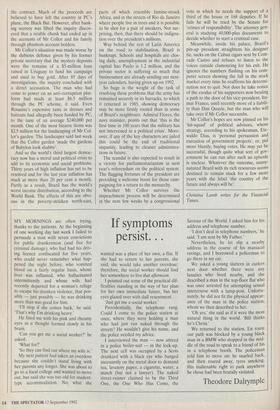If symptoms persist. .
MY MORNINGS are often trying, thanks to the patients. At the beginning of one working day last week I failed to persuade a man with seven convictions for public drunkenness (and five for criminal damage), who had had his driv- ing licence confiscated for five years, who could never remember what hap- pened the night before, who vomited blood on a fairly regular basis, whose liver was inflamed, who hallucinated intermittently and whose wife had recently departed for a woman's refuge to escape his drunken violence, that pos- sibly — just possibly — he was drinking more than was good for him.
'I'll stop if she comes back,' he said. 'That's why I'm drinking heavy.' He fixed me with his pink and rheumy eyes as a thought formed slowly in his brain.
`Can you get me a social worker?' he asked.
`What for?'
`So they can find out where my wife is.'
My next patient had taken an overdose because she couldn't stand living with her parents any longer. She was about to go to a local college and wanted to move out, but said she was too old for student- type accommodation. No; what she
wanted was a place of her own, a flat. If she had to return to her parents, she said, she would take another overdose: thetefore, the social worker should find her somewhere to live that afternoon.
I pointed out some of the practical dif- ficulties standing in the way of her plan for her own immediate future, but her eyes glazed over with dull resentment.
'Just get me a social worker.'
Providentially, the telephone rang. Could I come to the police station at once, where they were holding a man who had just run naked through the streets? He wouldn't give his name, and the police needed my advice.
I interviewed the man — now attired in a police boiler-suit — in the lock-up. The next cell was occupied by a Scots drunkard with a black eye who banged incessantly on the metal door to demand tea, lavatory paper, a cigarette, water, a match (but not a lawyer). The naked street-runner claimed to be the Third One, the One Who Has Come, the Saviour of the World. I asked him for his address and telephone number.
`I don't deal in telephone numbers,' he said. `I am sent by My Father.'
Nevertheless, he let slip a nearby address in the course of his maniacal ravings, and I borrowed a policeman to go there in my car. We asked a young slattern in curlers next door whether there were any lunatics who lived nearby, and she described a man in the top-floor flat who was once arrested for attempting sexual intercourse with a lamp-post. Unfortu- nately, he did not fit the physical appear- ance of the man in the police station, whom we then described to her.
`Oh yes,' she said as if it were the most natural thing in the world. 'Bill thinks he's Christ.'
We returned to the station. En route our path was blocked by a young black man in a BMW who stopped in the mid- dle of the road to speak to a friend of his in a telephone booth. The policeman told him to move on: he snarled back, and then roared away, tyres smoking. His inalienable right to park anywhere he chose had been brutally violated.
Theodore Dalrymple


































































 Previous page
Previous page